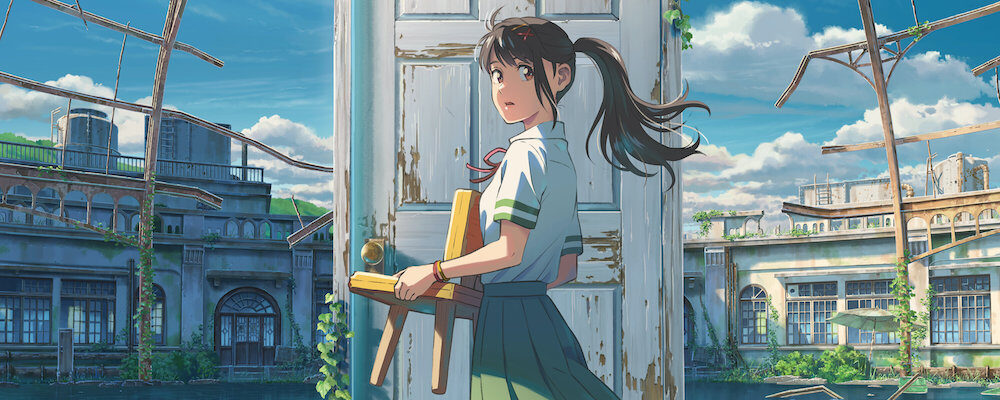‘Suzume’: Makoto Shinkai Explores Matters of the Heart With Stunning Anime Fantasy
Alci Rengifo
No other genre taps into the limitless possibilities of animated cinema quite like anime. “Suzume,” is a fantasy action story told with visuals best described as dreamscapes. It is the latest work from Japanese filmmaker Makoto Shinkai, who has established himself as one of the genre’s most important figures. There is an unabashed romanticism in his work, which continues in this film. It also marks somewhat of a departure from Shinkai’s usual plotlines. Typically his movies are enveloping, sensual slow burners that build to stunning crescendos. “Suzume” is a road trip adventure, told with high energy and popcorn entertainment. Because it is Shinkai and his astoundingly talented team, it’s precisely an even better, richer escape than the norm.
The fate of the world is at stake, which is also a good metaphor for how young love can feel. Suzume (Hara Nanoka) is a teenager living with her aunt in one of those gorgeously picturesque towns typical in a Shinkai movie. While riding her bike to school, Suzume meets Souta (Matsumura Hokuto), a young man searching for an abandoned spot with doors. The encounter leads Suzume to discover an abandoned reservoir where a giant, blazing red column only she can see is emerging from a portal, which Souta is attempting desperately to close. This is because he is tasked with closing such portals before entities are unleashed from the “Ever-After,” meaning a realm where our souls go after we die. When another entity from the beyond, taking the form of a cat named Daijin (Ann Yamane), turns Souta into a chair, Suzume is determined to help him complete the mission to keep the Ever-After locked away.
“Suzume” continues Shinkai’s recent obsession with finding romantic allegories in catastrophes. His biggest hit, “Your Name,” was an international box office success where two teens fall in love through a fantastical gender-swapping plot, which is then tied to a comet breaking apart and crashing into a town. It’s a brilliantly hallucinatory film. “Suzume” also utilizes apocalyptic imagery to convey grandiose emotions. The portals that open into the Ever-After are designed as reflections of Suzume’s own need to close a door on her painful memories of losing a mother. Meeting Souta opens the door to adventure and self-discovery. In other words typical teenage material, but elevated to a more poetic level than the usual animated entertainment we tend to make in the United States.
Already there are some grumblings from certain fan sectors that “Suzume” doesn’t live up to the promise of Shinkai’s previous titles. It’s a bit of an unfair judgment. “Your Name” is indeed a superior work, but this movie is closer to the more grounded aspects of his other films, such as the wonderful and evocative “The Garden of Words.” Like few other filmmakers, Shinkai and his team create a mood with nature, as in his 2019 movie “Weathering With You,” where a character literally controls the weather. Here rain creates atmosphere and melancholy, starry skies are luminously illustrated and action scenes have an elegant structure. We’re exhilarated but not bombarded by manic editing. Animals are used in a way similar to the classic works of Hayao Miyazaki, as both lovable but essential to the story. Daijin can instantly be called cute, but he’s more than a fluffy accessory. Catching him is vital to stopping a coming cataclysm. Souta spends most of the movie as a chair that can run, yet it’s not a gag. He’s cursed by Daijin and is animated in a way that has urgency and despair.
Instead of becoming too gimmicky, “Suzume” takes detours and lets the characters grow. In her quest to help Souta, Suzume meets Rumi (Ito Sairi), a bar owner who takes her in and lets her work at the establishment. It is the kind of added storyline you would find more often in an indie. Japanese animation functions as real cinema in how it allows layers to unfold, without feeling forced to fill in every break with song and dance routines. Serizawa (Kamiki Ryûnosuke), a classmate of Souta’s trying to be a teacher, first comes across as a cocky jerk, then helps Suzume and even seems to build a bond with her aunt. The drama is heightened by the music, where composer Kazuma Jinnouchi’s orchestral passages are complemented with songs by Radwimps, a Japanese rock band that regularly collaborate with Shinkai.
It says something that Shinkai’s “weakest” movie is far and away better than most crass, shallow offerings at the box office. The teenagers in “Suzume” never feel dumbed down, even when they have the naivety of youth. While battling forces from the beyond, their true struggle is with powerful feelings of love, attraction, emotional scars and growth. Does Suzume fall in love a little too quickly with Souta from just one meeting on the road? Perhaps, but being young also means being open to such sudden reactions. The point is few animated or live-action films will have you discussing these topics after the end credits. A cat is chased down a roller coaster as a giant red menace threatens to cause an earthquake, yet somehow we’re thinking about getting over the past. That’s what makes Shinkai’s work special. “Suzume” is a feast for the eyes that ends by being about much more than looks.
“Suzume” releases April 14 in select theaters.

